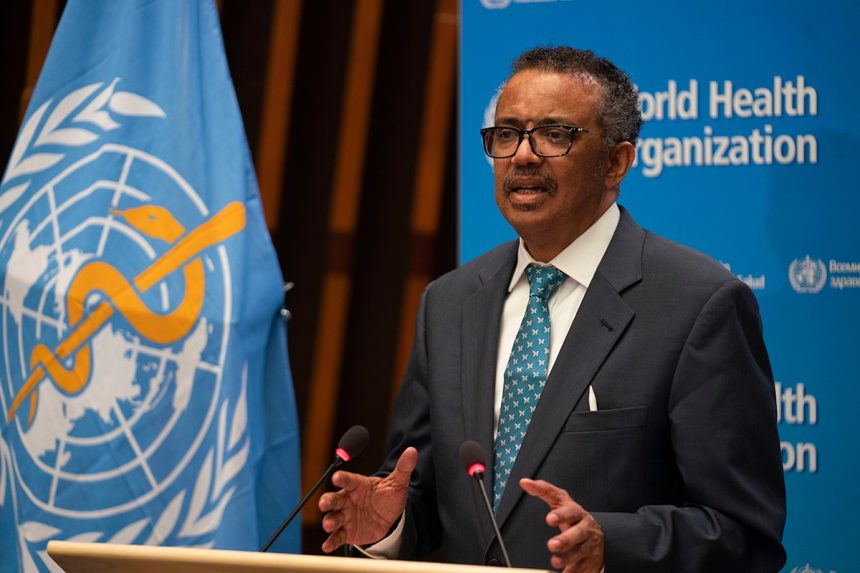To make sure that the world is prepared for the next pandemic, Disease X, which could be 20 times deadlier than COVID-19, the World Health Organisation (WHO) has called for a world pandemic treaty.
Director General of WHO, Dr. Tedros Ghebreyesus, at the World Economic Forum in Davos, Switzerland, last week, called on countries to sign on to the health organisation’s pandemic treaty so the world can prepare for “Disease X.”
Ghebreyesus, speaking in front of an audience at the World Economic Forum, said that he hoped countries would reach a pandemic agreement by May 2024 to address this “common enemy.”
Disease X is a hypothetical “placeholder” virus that has not yet been formed, but scientists say it could be 20 times deadlier than COVID-19. It was added to the WHO’s short list of pathogens for research in 2017 that could cause a “serious international epidemic,” according to a 2022 WHO press release.
Ghebreyesus said that COVID-19 was the first Disease X, but it’s important to prepare for another pandemic.
“There are things that are unknown that may happen, and anything happening is a matter of when, not if, so we need to have a placeholder for that, for the diseases we don’t know,” Ghebreyesus said.
“We lost many people [during COVID] because we couldn’t manage them,” Ghebreyesus said at the global confab. “They could have been saved, but there was no space. There was not enough oxygen. So how can you have a system that can expand when the need comes?”
He said that a shared response via the treaty would help the world better react to another outbreak.
“The pandemic agreement can bring all the experience, all the challenges that we have faced and all the solutions into one,” Ghebreyesus said. “That agreement can help us to prepare for the future in a better way.”
“This is a common global interest, and very narrow national interests should not come into the way.”
Ghebreyesus said that independent panels and experts have been working on ways to respond in a collective fashion and that a deadline for the treaty to be signed is in May.
He said that some of the preparedness responses could include an early-warning system, organising supply chains and advancing research and development to test drugs. Primary health care would need to be looked at, too, given that wealthy countries did not fare well during COVID, since they struggled with basics like contact tracing.
“It’s better to anticipate something that may happen because it has happened in our history many times, and prepare for it. We should not face things unprepared; we can prepare for some unknown things, as well.”
World leaders met in March 2021 to announce that a treaty was being negotiated and drafted.
“The main goal of this treaty would be to foster an all-of-government and all-of-society approach, strengthening national, regional and global capacities and resilience to future pandemics,” a statement put out by two dozen heads of state reads.
“This includes greatly enhancing international co-operation to improve, for example, alert systems, data-sharing, research and local, regional and global production and distribution of medical and public health countermeasures such as vaccines, medicines, diagnostics and personal protective equipment.”
In 2022, the WHO convened over 300 scientists to look into 25 virus families and bacteria and create a list of priority pathogens that should be further researched. The list included Disease X, to indicate an unknown pathogen that could cause a “serious international epidemic.”
The United Nations (UN) agency ranks Disease X alongside Covid-19, Ebola, Zika virus, Crimean-Congo hemorrhagic fever, Middle East Respiratory Syndrome (MERS-CoV) and Severe Acute Respiratory Syndrome (SARS).
Experts do not yet know what type of virus will trigger the next pandemic, but scientists have warned for decades that bird flu is the most likely contender.
Researchers say this is because of the threat of recombination — with high levels of human flu raising the risk of a human becoming co-infected with avian flu as well.
Others have long speculated Disease X would more generally come from zoonotic transmission — an animal virus or bacteria that jumps to humans.
Some have even warned Disease X could be sparked by a biological mutation, an accident or a terror attack that catches the world by surprise and spreads fast.












